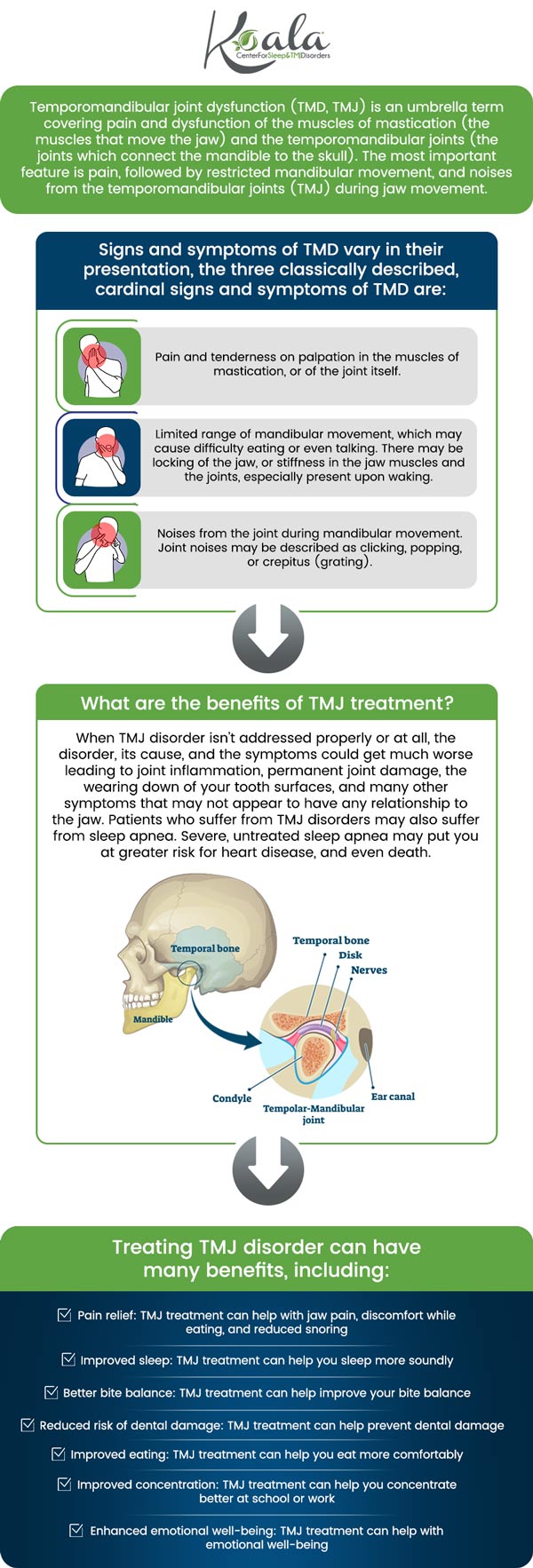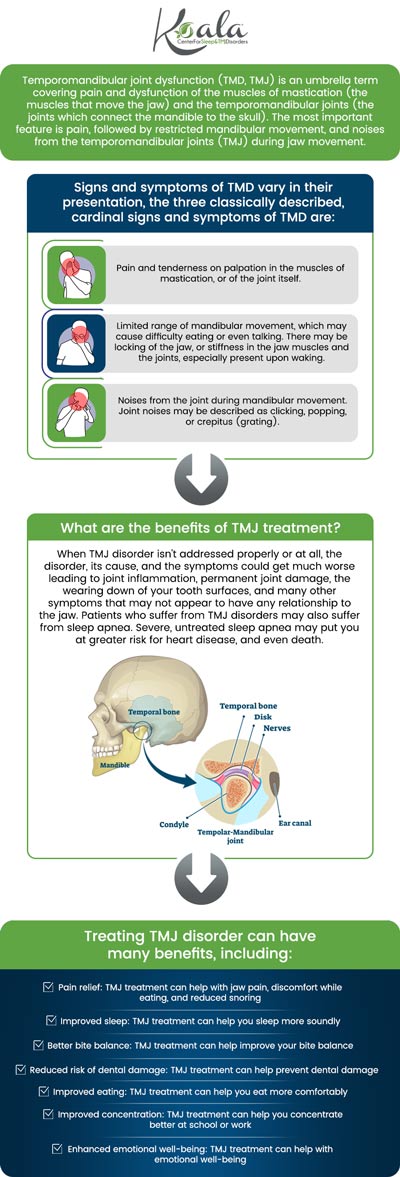Types of Conditions that May Affect the Temporomandibular Joint (TMJ)
There are many causes of TMJ. Get it checked today at Koala® Center For Sleep & TMJ Disorders. For more information call us at one of our clinics today or request an appointment online. We serve patients from all over the USA. Locations in Bloomington IL, Peoria – Dunlap IL, El Paso TX and Wausau WI.




Table of Contents:
What can cause issues with the TMJ?
What is the most common cause of temporomandibular joint dysfunction?
What conditions are secondary to TMJ?
Many different factors have been linked to TMJ disorders and seem to be sources of issues with the temporomandibular joint. However, in most cases, the exact cause of a TMJ disorder in an individual may not be known or be able to be pinpointed down to one main source. Broadly speaking, a TMJ disorder is the result of an issue in the jaw that is causing the patient to feel pain in the temporomandibular joint or the surrounding muscles. The temporomandibular joint works by combining a sliding motion and hinge action of the jaw to allow it to open and close in a smooth motion. Injury to the jaw is one of the main causes of TMJ disorders that can be easily pinpointed due to the nature of the impact that causes the temporomandibular joint to get knocked out of its proper alignment. The joint is cushioned by cartilage wrapping the bones, which is then separated by a small shock-absorbing disk. Damage or erosion of this disk, or arthritis in the cartilage in the jaw can also cause TMJ disorders to develop. Additional causes of TMJ disorders, although less common, include clenching and grinding of the teeth, an uneven bite as the result of a crown or filling, excessively chewing gum, stress, and the use of orthodontic braces, although this one has mixed feelings from professionals who work with TMJ disorders.
The exact cause of TMJ hasn’t been conclusively tied back to one event or condition, although the source of the pain stems from a misalignment in the temporomandibular joint. The main cause of the misalignment or improper movement of the jaw can often be difficult to diagnose unless it can be linked to a significant event that impacted the jaw or a disease that has caused a breakdown in the structure of the jaw. The temporomandibular joint works as a combined sliding motion and hinge action, creating a smooth movement of opening and closing. The smooth movement is maintained by a small shock-absorbing disk that separates and cushions the cartilage that covers the bones of the joint. An injury with blunt force trauma to the jaw is one of the main causes of TMJ disorders as it can cause the temporomandibular joint to shift out of place, as well as cause damage to the bones and cartilage in the joint. Other causes that have been shown to cause TMJ disorders include arthritis in the joint’s cartilage, erosion of the disk separating the cartilage, clenching and grinding of the teeth, change to the bite as the result of dental treatments like a crown or filling, excessive gum chewing, stress and the use of orthodontic braces.
TMJ disorders can cause a whole host of additional conditions that people may not commonly associate as being related to their jaw. While pain in the jaw is to be expected, other areas of the face and body can be affected by TMJ disorders. Severe headaches and migraines are often linked to issues with the temporomandibular joint. While the pain of TMD originates from the jaw joint, it can radiate to other parts of the body and cause muscle strain and tenderness in the neck, shoulders, and back as a result of the pain radiating down the vertebrae. TMJ disorders can also cause damage to internal organs through the continued use of pain killers and anti-inflammatories used to try to manage pain symptoms. These medications can be hard on your stomach, liver, and kidneys, especially when taken in doses higher than recommended or for prolonged periods of time. Strained and tight muscles resulting from TMJ disorders can also cause tingling or numbness in the face and upper body due to excessive pressure placed on the nerves. Reach out to our team of leading healthcare professionals today at Koala® Center For Sleep & TMJ Disorders. We are here to help treat TMJ and we care about your health.

Additional Services You May Need
▸ KoalaKIDZzz®
▸ Sleep Apnea
▸ Snoring
▸ TMJ Disorder
▸ Fatigue
▸ Sleep Disorders
▸ Weight Loss
▸ CPAP Alternative
▸ Oral Appliances




